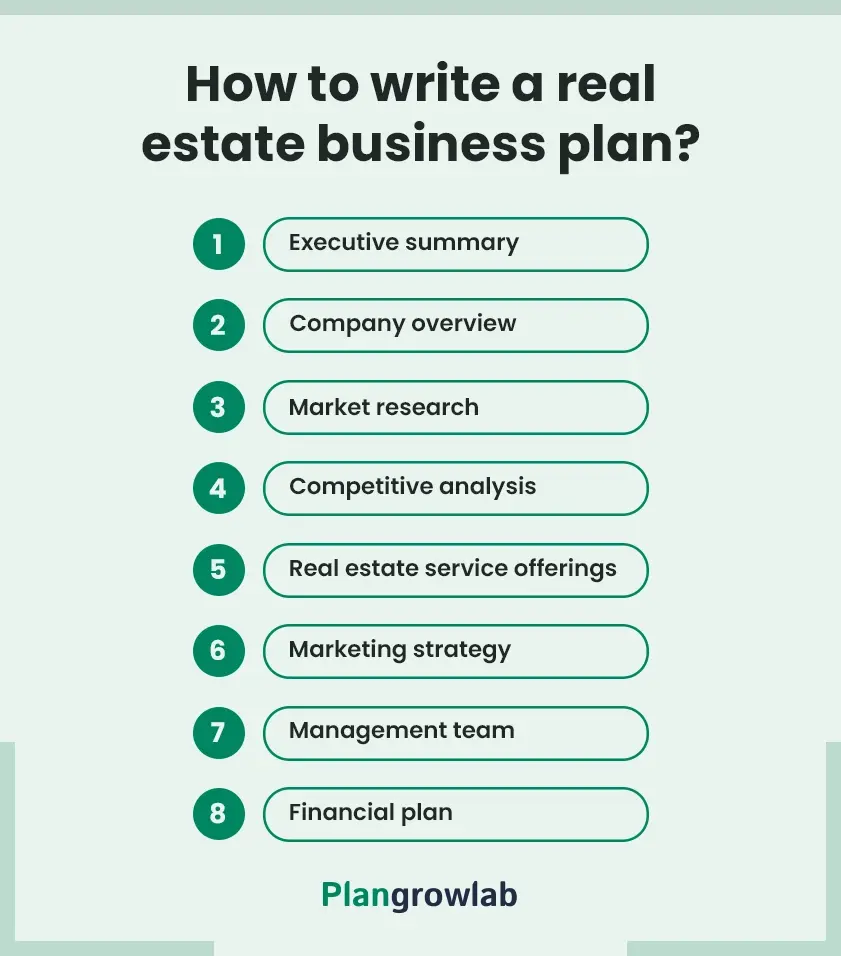Did you know: The global real estate market is all set to hit a whopping $634.90 trillion in 2024? So, there’s no better time to jump in, especially if you’ve considered launching your own real estate business.
But before that, you need to create a solid plan to win investors and succeed in this dynamic industry.
Got stuck—how to draft a real estate business plan?
Worry not. In this guide, I’ll walk you through the actionable steps and useful tips to craft a comprehensive business plan.
Further, I’ve shared thoughts of James Baiseri, the owner of KALEO Real Estate Company, including what hurdles he faced and which strategies worked well for him.
Let’s begin!
Why do you need a real estate business plan?
Whether you’re just starting out or already have experience in the real estate market, keeping a real estate business plan is essential to stay focused and organized.
It’s like having a roadmap that helps you establish a strong foundation for your real estate business and make it thrive.
Check out these top 3 reasons why it’s crucial:
- Forces you to define your goals and vision in a clear manner, giving you a structured approach to achieving milestones and growing your business successfully.
- Enables you to navigate the real estate market and easily understand who your competitors are, what your clients want from you, and what are the current trends.
- Demonstrates your real estate company’s potential profitability and financial viability to investors or lenders, helping you secure the funding you expect.
Simply put, keeping a business plan guides you through every step of the way, from identifying market opportunities and targeting residential buyers or property owners to delivering exceptional client experiences.
How to write a real estate business plan?
While preparing a real estate business plan, you should consider including several well-defined sections to articulate your business goals and strategies.

Here’s a guide on how to draft a successful real estate business plan, including all the key elements:
1. Executive summary
An executive summary is a quick, concise overview of the entire real estate business plan. Usually, it offers a high-level introduction to your real estate company.
That’s why, even though it’s the first section, writing your plan summary would be more convenient at the very end..
While planning this section, consider explaining the following points in brief:
- Registered business name and its location
- Mission-vision statement
- Market opportunities
- Service offerings
- Sales and marketing tactics
- Financial outlook
In short, this executive summary section gives you a chance to make a good impression on potential investors or lenders and persuade them to invest. So, keep your executive summary simple, crisp, and compelling to capture readers' interest.
"My first draft was a mess. I was trying to cram in every detail with way too many numbers that belonged in the full plan. The hardest part was simplifying everything while keeping it exciting.
The turning point came when I focused on why the business mattered. I treated it like an elevator pitch—if I had two minutes to explain my business, what would I say?
I stuck to the basics: concept, target market, what makes us different, and a quick financial snapshot. The goal was to make people want to keep reading, not give them everything at once."—James
2. Company overview
In the company overview section, present your business concept in detail and give readers an in-depth understanding of your real estate business.
It clearly explains what your business is all about, including its structural aspects and business-specific facts that every financial backer needs to know.
For instance, you may incorporate the following information to draft this section carefully:
- Business legal structure
- Vision and core values
- Owners or partners
- Startup summary
- Short-term and long-term goals
Overall, this section offers a precise snapshot of your real estate company’s foundation and capabilities. So, make it impressive and jargon-free.
"When I was writing the business goals for my real estate company, I have to admit—The short-term plans were easy enough, getting up and running, landing a few clients, and building a reputation.
But thinking long-term made me really sit down and envision where we wanted to position ourselves in five or ten years.
We don’t just want to be another real estate company; we want to lead in areas like sustainable developments and smart home solutions. It forced me to look beyond the immediate future and think about what kind of legacy we want to build.”—James
3. Market research
Next, conduct a thorough real estate industry and market research to set a strong foundation for your business.
This will let you explore the right target market, demand for properties, and how your business intends to meet it. Plus, it will help you identify the opportunities in the market and develop strategies to stand out.
To make this section more impactful, give a detailed analysis of:
- Market size and its growth potential
- Target audience and customer segments
- Market needs
- Emerging industry trends
- Regulatory compliance
Moreover, analyze your potential clients’ preferences, behaviors, or pain points to adapt your real estate services and marketing efforts as well.
James’ experience also highlights that focusing on customer insights really matters to your business while gathering market data. However, in the early stages, he struggled to fully understand his target market, which affected his overall strategy. He noted:
"Identifying the target market for my real estate business was a real learning curve. At first, I thought the answer was simple: 'Everyone needs a home, so everyone’s my customer!'
But that broad approach didn’t work at all. I was trying to be everything to everyone, and as a result, I wasn’t connecting with anyone. I quickly realized I needed to narrow my focus, but figuring out exactly who my ideal clients were took some trial and error.”
4. Competitive analysis
Now, it’s time to provide a well-rounded picture of your main competitors.
Assess the competitive marketplace thoroughly and identify who your competitors are, what they offer, what are their strengths and weaknesses, as well as how you can differentiate your business to stay ahead.
Further, recognize market gaps and meet unmet customer needs to position your real estate services more effectively and gain a competitive edge.
This will help you clearly define your unique selling proposition (USP) and make your real estate company different and better.
"Don’t just look at what your competitors offer—look at how they’re positioning themselves, what their clients are saying, and where their weaknesses might be.
Then find a way to differentiate yourself, whether it’s through service, niche expertise, or the way you connect with clients. It’s all about finding that gap and filling it in a way that feels authentic to you."—James
5. Service offerings
This section describes the real estate services you’ll offer and explains how you plan to structure your fees.
Generally, real estate businesses often have multiple revenue streams. So, start by outlining your service categories, such as property sales, rentals, and consulting.
If applicable, jot down any specialties, including luxury homes, investment properties, and commercial real estate.
Also, discuss how each service will be executed and how you’ll make money. For instance, if you’re planning to run a rental agency, you may generate income from property management fees, rental commissions, and leasing agreements.
When you plan this section, don’t rush; take your time. Be specific about what sets you apart and think about the problems you’re solving for your clients. Even James reflected on this point and shared:
"At first, I made the classic mistake of narrowing down everything I could do: buying, selling, rentals, commercial properties, you name it.
But when I looked at it, it felt like doing it all wasn’t the best approach. I realized I needed to be more client-focused. I started asking myself, What does the client actually need from me during that process?
This focus helped me define my niche and deliver more value through specialized, client-centered services."
6. Marketing strategy
A robust marketing strategy is integral for attracting clients and establishing a strong brand presence. It summarizes all the strategies you’ve decided to promote or market your real estate business.
Here’s a list of several promotional techniques and methods you may include in your plan:
- Social media marketing
- Search engine optimization (SEO)
- Real estate listings and online ads
- Email marketing campaigns
- Partnerships with local businesses
A well-crafted marketing plan allows you to reach your target customers effectively and convince them to use your services.
"As I worked on my marketing strategy, one key insight really made a difference: marketing wasn’t just about selling homes—it was about building relationships.
I started using more personal branding in my strategy, sharing stories about my experiences as an agent, and highlighting client success stories.
I found that people responded more when I was real and relatable, rather than just focusing on sales pitches."—James
7. Management team
The next part of a real estate business plan is a management team that sheds light on the key people responsible for driving your company successfully.
This will help potential backers know more about your leadership team and how they work together to reach long-term objectives.
So, highlight real estate business owners, key executives, the general manager, and the rest of the management. Also, jot down their roles and responsibilities, educational qualifications, skills, and industry experience.
If your team is lacking, emphasize the staffing requirements and discuss how you’ll find the right talent to fill those roles.
"In real estate, trust is everything, and clients want to know the people behind the business. I found it tough at first to figure out how to balance experience with personality.
But then I realized it’s not just about listing our skills; it’s about why we’re passionate about real estate, what drives us, and how we work together.
So, I added a few personal touches, like how our finance director genuinely loves helping first-time investors feel confident, or how we all work together to make the process smooth and stress-free." — James
8. Financial plan
Preparing a detailed financial plan is the most important aspect of your real estate business planning as it allows you to draw investors’ attention and secure enough funding.
Typically, your real estate financial plan section should provide a complete summary of your business’s financial projections for the first few (3-5) years.
Following are a few critical financial statements and reports you must include in your plan:
- Profit and loss statement (income statement)
- Cash flow statement
- Balance sheet
- Break-even analysis
Besides that, explain how much funding you need and how you’ll use those funds, as well as mention your startup costs, revenue & sales forecasts, and scenario analysis.
"The toughest part, though, was figuring out cash flow. Real estate isn’t predictable—some months you’ll have a big closing, and others you might not see anything for a while.
Planning for those slow periods was tricky. I ended up reaching out to a few experienced agents I knew, and they advised me to keep at least three months' worth of operating expenses on hand as a buffer for those lean times.
That tip really saved me because it forced me to plan for the ups and downs." — James
Download now real estate business plan template
Ready to draft your real estate business plan from scratch? But not sure where to begin? Let’s ease your planning process with this free real estate business plan template PDF.
This investor-friendly sample business plan involves practical insights and examples to help you create your very own business plan quickly. Just download it and customize it as per your business-specific requirements.
Conclusion
After exploring this comprehensive guide and real-life insights, it’s now easier for you to build your very own plan that helps stand out and bring in clients.
However, if you need expert-level guidance to present your plan, our business plan consulting company will help! Our team of professional consultants will give you valuable advice and support to develop investor-ready plans, along with detailed financial projections.
So, wait no longer; make a call and connect with us today!
Frequently Asked Questions
Do agents really need a real estate business plan?
Yes, absolutely! A real estate business plan is crucial for agents as it allows them to identify target markets, develop growth strategies, acquire leads, secure deals, and achieve financial goals.
What are funding sources for real estate business?
There are various funding sources available for a real estate business:
- Bank loans
- Small Business Administration (SBA) loans
- Angel investors or partnerships
- Crowdfunding
- Government grants and funding
- Private or hard money lenders
How can I make my real estate business plan stand out to investors?
You should cover these essential points to make your real estate business plan stand out to investors:
- Clear vision and mission statements
- Compelling unique value propositions
- Thorough market insights
- Detailed financial projections
- Effective marketing and risk mitigation plans
- Comprehensive growth strategies
Can I use a template for my real estate business plan?
Yes, you can use a ready-made template to draft your real estate business plan. It saves you valuable time and offers a clear structure that covers all the necessary sections. You can easily edit or modify the content to meet your business needs.
What are the key financial projections I should include in my real estate business plan?
You should include the following key financial projections in a real estate business plan:
- Sales and revenue forecasts
- Income statement (profit and loss statement)
- Cash flow projections
- Balance sheet
- Break-even analysis
- Funding requirements (if any)
How much does it cost to write a business plan for real estate?
The cost of writing a real estate business plan can vary significantly depending on the mode of business plan creation:
- DIY approach: Requires minimal costs, and mainly demands your time and effort.
- Hiring professional consultants or writers: Varies from $25,000 to $50,000.
- Business plan software: Starts at just $7/month.

